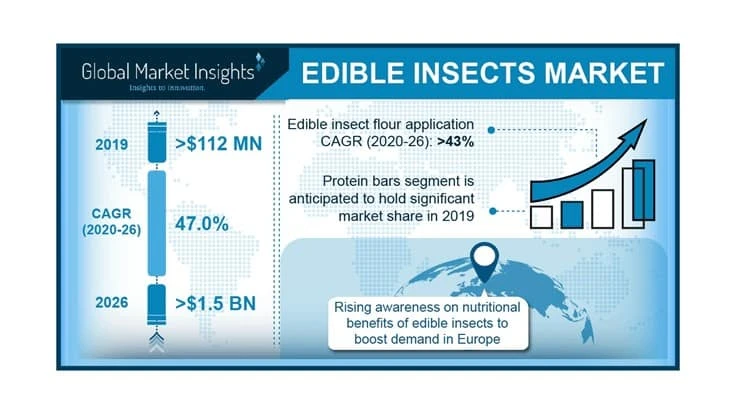
The edible insects market size exceeded USD 112 million, globally in 2019 and is estimated to grow at over 47% CAGR between 2019 and 2026, according to a new study from Global Market Insights..
Edible insects are roasted, dried, and powdered to form high protein and low-calorie flour. Most common edible insects available for consumption in market includes beetle, locusts, cricket, and ants. These powders are widely used in preparing low calorie energy bars and snacks owing to their compatibility with various natural ingredients and flavors.
Also, easy availability, protein extraction, high nutritional profile, and economic processing techniques is making edible insects popular among consumers which is likely to boost market demand.
Increasing farming of insects owing to minimum investment along with rising cases of livestock diseases is making consumers opt for safe and economical edible insect products. Industry players are rapidly investing in R&D and marketing to capitalize on emerging trends in food & beverage sector by introducing innovative products which should boost edible insects market trends.
Insects are sustainable source of amino acids & proteins requiring less water, land and producing fewer emissions during their production process. They are also rich in omega 3, minerals, and iron which makes them compatible with manufacturing low calorie and nutritious flour. Additionally, rapid adopting of edible insect protein in food & beverage industry and increasing trends towards sustainable manufacturing practices is likely to boost edible insects market demand.
The Canadian Food Inspection Agency (CFIA) sets standards, establishes policy, and provides information on safety and nutritional value of food. CFIA has branded insects a “Novel Food Item” and allows four insect fragments & 25 dead mites for every 225 grams of cheese products. This regulation is helping industry players to introduce safe edible insect preparations which should boost the global market growth.
Edible insects are considered as food additives. These products fall under the Federal Food, Drug, and Cosmetic Act (FFDCA). Insect based products must have the standard practices of all other US foods and producers must be FDA approved. All insect products must be labeled with both scientific and common name.
This regulation is helping manufactures to introduce new innovative products in the market and gain brand recognition which is likely to edible insects boost market statistics.
These and other findings are explored in the GMI report, which can be accessed by requesting a sample report.
Latest from Quality Assurance & Food Safety
- Chef Robotics Introduces Pat-Down Capability for Meal Presentation and Sealing
- USDA Launches Regenerative Pilot Program
- Indoor Ag-Con Adds Food Safety Track to Conference Lineup
- IDFA Recognizes Federal Officials for Support of U.S. Dairy Industry
- Tetra Pak Acquires Bioreactors.net
- Fresh Del Monte Receives Rabobank Leadership Award
- São Paulo Earns Guinness World Record for Largest Municipal Food Security Program
- KPM Analytics Releases Ready-to-Use NIR Calibration Packages





